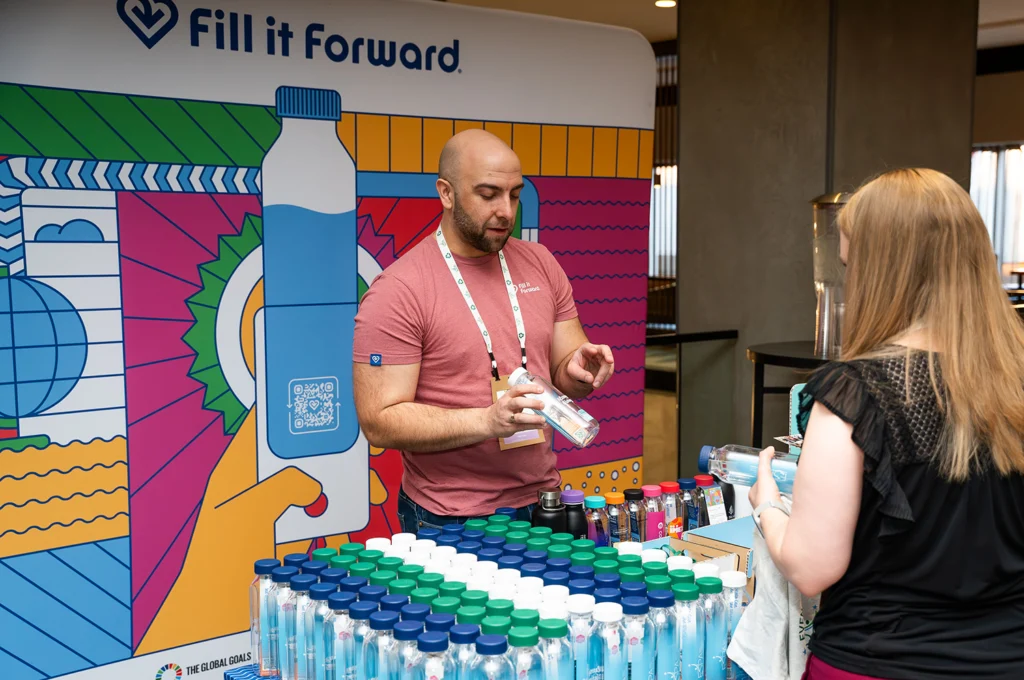Wellness by Design: 8 Proven Ways to Create Health-Conscious Events
By Denise Reid, Past President, Event Service Professionals Association (ESPA)
The numbers don’t lie: Life expectancy is higher than ever. But so, too, are the rates of chronic physical and mental health challenges.
Studies show that 77% of professionals report experiencing burnout at work. Almost one in five struggles with their mental well-being.
Burnout, anxiety and exhaustion don’t stay at home.
They walk into every ballroom, meeting room and networking session at your event—draining energy, stifling creativity and dulling the overall experience.
Event planners are doing something about it.
And event service managers are in a unique position to guide them.
Wellness is no longer a nice-to-have at events. It’s a must-have. Planners weave wellbeing into every detail, including room design, menus, breaks and even engagement touchpoints.
It’s about helping attendees focus, connect and get the most out of their experience.
These aren’t just program add-ons. Wellness is now a guiding philosophy that shapes everything from space design to how participants are nourished and engaged. Event service managers, being the experts of their properties, can help show planners how to best implement these strategies in ways that are both creative and achievable.
By staying educated on these most current trends, they become thought leaders for their clients and stakeholders, providing real solutions and elevating the value of their hotels.
Here are some of the most effective ways planners—and the hotel professionals who support them—bring that philosophy to life.
Impactful Room Design
Event professionals are rethinking spaces to actively support well-being, using design as a tool for comfort and engagement.
Instead of rigid rows under harsh lights, they’re opting for flexible seating that accommodates lounging, standing and traditional setups. Natural light, warm lighting and biophilic elements like greenery and water features create calm, restorative environments.
This is where event service managers can step in.
By pointing out underutilized areas for micro-lounges, suggesting acoustic solutions, or showing how transition spaces can be carved out, they can help planners get the most out of the property while meeting wellness goals.
Mental Health Support
Mental health support is now an integral part of the planning process. Events offer mindfulness sessions, resilience workshops, and staffed help desks.
Event service managers can guide planners toward the right rooms or spaces within the hotel for these activities, whether that’s a quiet area for meditation, or a central spot for resource stations, helping ensure the programming flows naturally within the property.
Additionally, as key service providers within the city, they can proactively connect planners to local resources or to the CVB services team to help guide them on wellness speakers, yoga, exercise or meditation providers and more.
Movement and Guided Breaks
Breaks are no longer just about coffee and hallway chatter. Sitting for hours can deplete energy, so planners are adding guided stretches, energizer breaks, and even walking sessions.
Here, event service managers can recommend spaces that lend themselves to movement—terraces, courtyards, ballrooms or wide corridors—so that wellness is seamlessly integrated into the event design.
Hydration That Fuels Performance

Hydration is being prioritized in new and creative ways: vegetable or fruit-infused water, herbal teas, and mobile hydration carts.
Hotel event service managers can advise where to place hydration stations for maximum impact and accessibility, ensuring this valuable wellness element is both visible and easy to implement, and ensuring it’s replenished throughout the event.
Mindfulness & Reset Zones
Quiet, tech-free reset spaces are becoming a staple at large events. With soft lighting, calming soundscapes, and comfortable seating with soft blankets, they give attendees a chance to recharge.
Event service managers know their properties best. By identifying tucked-away rooms or unconventional areas, they can show planners how to bring mindfulness zones to life and help connect them to additional resources that will set the right mood in the space.
Menus That Nourish
Menus are shifting to lighter, nutrient-dense options designed to sustain energy. Local produce, plant-based dishes, and nutritional labeling are becoming standard.
Event service managers can take an active role in menu planning and connect planners with hotel culinary teams to suggest ways food choices can reflect both wellness goals and the venue’s strengths, helping to balance health with creativity while acknowledging popular dietary restrictions.
Smarter Scheduling
Wellness is shaping schedules too, with later starts, built-in downtime, and live attendee feedback to adjust programming.
Event service managers can help planners think through how agendas align with hotel operations, ensuring wellness initiatives are practical as well as impactful.
Techniques include “quiet start” mornings with no sessions before 9 a.m., adding 15‑minute breaks between heavy sessions, and including live attendee check‑ins via apps to gauge energy and adjust programming.
Engagement That Inspires
Wellness-oriented engagement—from affirmation walls to step challenges—encourages connection and energy.
Event service managers have the unique benefit of working with many prior groups of all types, sizes and demographics. They can put those experiences to use to proactively share success stories and ideas from previous groups, helping planners visualize how these concepts could work in their spaces.
Why These Tactics Work
Events aren’t just schedules. They shape how people feel, connect and grow. Integrating well-being turns them from functional to transformative: clearer thinking, deeper connections, lasting value.
For hotel event planners and professionals, this creates a clear opportunity.
By learning wellness trends and guiding planners on how to apply them within their hotels, event service managers elevate their role from order-takers to thought leaders. They become trusted advisors who partner with planners to deliver energizing, memorable events—while showcasing the property’s strengths. Staying informed about these and other trends is a critical component to their professional development.
Forget “someday.” Wellness is the standard now. And with event service managers leading the way, events stop being a set of sessions. They become something more: impactful experiences that people remember—and act on.

